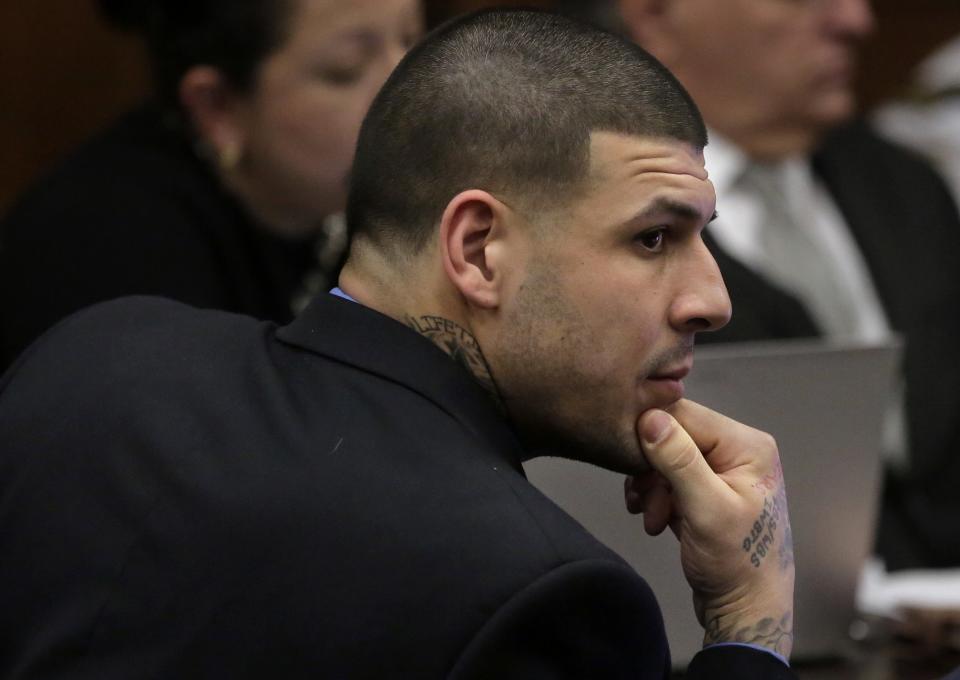Jury's question for judge may not bode well for Aaron Hernandez
BOSTON – A question from the jury on Friday may be a clue to their eventual verdict in the Aaron Hernandez double-homicide case, and it didn’t appear promising for the former New England Patriot star.
Reading too much into jury questions is always dangerous. However, it was the only bit of news to emerge Friday as the jury was given the case and deliberated for six and a half hours whether Hernandez killed two Cape Verdean immigrants in a 2012 drive-by shooting. They will resume their duties Monday at 9 a.m. In the meantime, any morsel of information about their thinking is dissected by lawyers, family members and onlookers.
Just after lunch on Friday, the jury asked Suffolk Superior Court Judge Jeffrey Locke the following question via a written note:
“If an immunized witness provides specific testimony that we believe would give enough evidence for a conviction, do we have to have corroborating evidence for that specific piece of testimony?” the note read. The word “specific” was underlined.

Locke, after a brief hearing with prosecutors and defense attorneys, told the jury “the direct answer is no.” However, he read a more elaborate explanation from Massachusetts law that says a jury doesn’t need corroboration for a specific piece of testimony just “corroboration to at least one element of charged crime or crimes.”
What this means for Hernandez is, again, not 100 percent certain, however, the state gave immunity deals to six witnesses, including its star, Alexander Bradley, who is the lone person that says Hernandez was the triggerman in the shooting.
If the jury is willing to believe Bradley, then Hernandez has a difficult case to prove. The wording of the note suggests – although does not prove – they believe in the testimony of some immunized witness.
Hernandez’s defense was based significantly on blowing up the credibility of Bradley, a convicted felon and admitted drug and gun dealer from Connecticut. Lead defense attorney Jose Baez provided an alternate theory that charged Bradley was actually the killer, not Hernandez. Baez called the state’s decision to grant him immunity for his testimony a “deal with the devil” and assailed him as a “liar” and a “career criminal” who duped the Commonwealth into “the deal of a lifetime.”
Baez also criticized other witnesses who were granted immunity, including Hernandez’s fiancée Shayanna Jenkins-Hernandez. He stated prosecutor Patrick Haggan was so desperate to convict the NFL star that they handed out plea deals with unfair generosity.
“They are handing out immunity in this case like its Halloween,” Baez said on Thursday. “Mr. Haggan is the next Oprah Winfrey: ‘You’ve got immunity, you’ve got immunity, we’ve all got immunity.’ That’s not how you build a case. You’re not the Oprah Winfrey of immunity.”
Hernandez is standing trial for the killing of Daniel de Abreu and Safiro Furtado in a drive-by shooting in the Boston Theater District. The Commonwealth alleges Hernandez grew enraged after de Abreu spilled a drink on him earlier in a nightclub. Unable to let such a sign of disrespect go, the prosecution says that Hernandez later hunted de Abreu and his party down at closing time and ordered Bradley to drive up on their car.
Hernandez is already serving a life sentence without the possibility of parole for the 2013 murder of Odin Lloyd. While his freedom doesn’t hang in the balance here, the state is prosecuting this in an effort to solve a double homicide and seek justice for the families of the victims.
After Locke read the question, the jury returned to deliberations. Now comes a weekend with everyone left wondering what they are thinking.
More from Yahoo Sports:
• Eric Adelson: NFL prospect opens up about rare disease
• Russell Westbrook clinches historic triple-double season
• Jeff Passan: Marlins’ mess may scare off potential buyers
